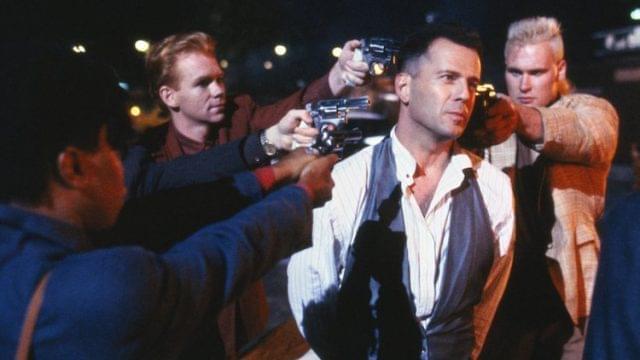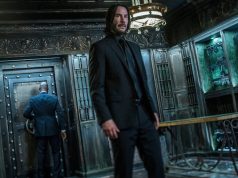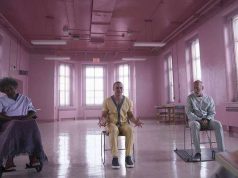
Before he became a big-time action star, Bruce Willis was just the smirking wise-cracker on TV’s “Moonlighting,” which was a great show, on the rare occasions that Willis and Cybill Shepherd could be civil to each other long enough to shoot a new episode, which amounted to about six weeks out of the year. Then, growing tired of starring in a successful TV show that didn’t require him to work very much, Willis set out to make movies and to reinvent himself as an action hero.
At first, everyone scoffed. This smug, balding little twerp was going to be an action star? On the other hand, the biggest Hollywood heroes of the day were Arnold Schwarzenegger and Sylvester Stallone, neither of whom could even speak English, let alone engage in witty banter with villains. (Delivering a pun based on the manner of the villain’s death does not qualify as “banter.”) So why not Bruce Willis?
“Die Hard” and “Die Hard 2: Die More Harder” were huge hits in 1988 and 1990, and that gave Willis the confidence to try an idea he’d come up with himself. The concept: a grating action-comedy where the action doesn’t make sense and the comedy isn’t funny. The film: “Hudson Hawk.” The result: I CANNOT SEE YOU, FOR I HAVE CLAWED MY EYES OUT.
The box office failure of “Hudson Hawk” was at least partially due to faulty marketing. It was billed as an action comedy — starring the guy from the “Die Hard” movies! — when it was really an absurd spoof. Audiences went in expecting one thing, came out frustrated that they got something else instead. It’s like the time Eddie Murphy inadvertently picked up a prostitute who turned out to be a dude. (Yeah … “inadvertently.”)
But that’s not the only reason the movie flopped. Even if you know ahead of time what sort of movie it is — as I did, before I watched it for this column — it’s still almost unbearable. It thinks chaotic, loud, shrill, and asinine are all synonyms for funny. That might be true at Two and a Half Men sitcom headquarters, but not in the real world.
Willis plays the title character, a cat burglar who earned the nickname “Hudson Hawk” because he grew up near the Hudson River and fed mostly on rodents and small birds. As the film begins, he has just been freed from prison and reunited with his buddy, Tommy Five-Tone (Danny Aiello), who evidently just moved here from a Damon Runyon story. Hudson is immediately dragged back into a life of crime by a couple of low-level mafiosi, who force him and Tommy to rob an auction house. Somehow the CIA gets involved, too, along with the Vatican and a pair of billionaire jackasses called the Mayflowers (played by Richard E. Grant and noted loudmouth Sandra Bernhard).
It’s all related to a conspiracy to steal three artifacts made by Leonardo Da Vinci. These artifacts have crystals hidden inside them that, when put together, will create a machine that can turn lead into gold. Evidently Da Vinci came up with this brilliant device, then hid the components so no one could ever use it. I bet he bragged to his friends, though. “You know, I came up with a machine to turn lead into gold! I just prefer not to use it. But I totally could!” And his friends rolled their eyes and said, “Whatever, Leonardo. Why don’t you fly home in your HELICOPTER?!” Then they all laughed, because they didn’t know that he really did invent a helicopter.
Hudson gets whisked away to Rome to steal the next artifact, and that’s where he gets involved with a Vatican operative named Anna, who is played by Andie MacDowell, who is an enemy to acting. To compensate for all the smirking hamminess Bruce Willis is serving up, MacDowell steels her face into a rictus and deploys every line of dialogue flatly, like a hostage being forced to read a prepared statement by an off-camera terrorist.
The CIA squad is led by a growly old James Coburn, who remarks that the CIA isn’t afraid of the Vatican or anyone else. “We blow up space shuttles for breakfast,” he says, providing one of those delightful WTF? moments that you stumble across sometimes in movies that are trying too hard. All the CIA agents have candy bars for code names. One of them, Kit Kat, never speaks, instead delivering his thoughts on little cards that have been pre-printed with whatever he might want to say. Kit Kat’s muteness seems like an unnecessary affectation until you realize he’s played by David Caruso. Then you count your blessings.
I cannot describe for you the specific workings of the plot. They are inane — perhaps intentionally so, as a send-up of inane action films, but inane nonetheless. Intentional inanity, if not done humorously, is still just inanity. During an exceptionally long sequence of car chases, ludicrous stunts, and general loudness, I realized it had been what felt like several minutes since I’d paid attention to anything. I have to assume this chunk of the screenplay just said “[idiocy]” on one page and “[ibid.]” on the next few, leaving the filmmakers to come up with the specifics on the set.
Bruce Willis survived the “Hudson Hawk” debacle, of course. He put it behind him, then focused for a while on that embarrassing thing where he kept playing blues harmonica and trying to be a honky-tonk musician, then put THAT behind him, and then got back to the business of smirking at things while delivering snarky bons mots in action films. That’s what he’s good at. Especially without Cybill Shepherd harassing him.
— Film.com





